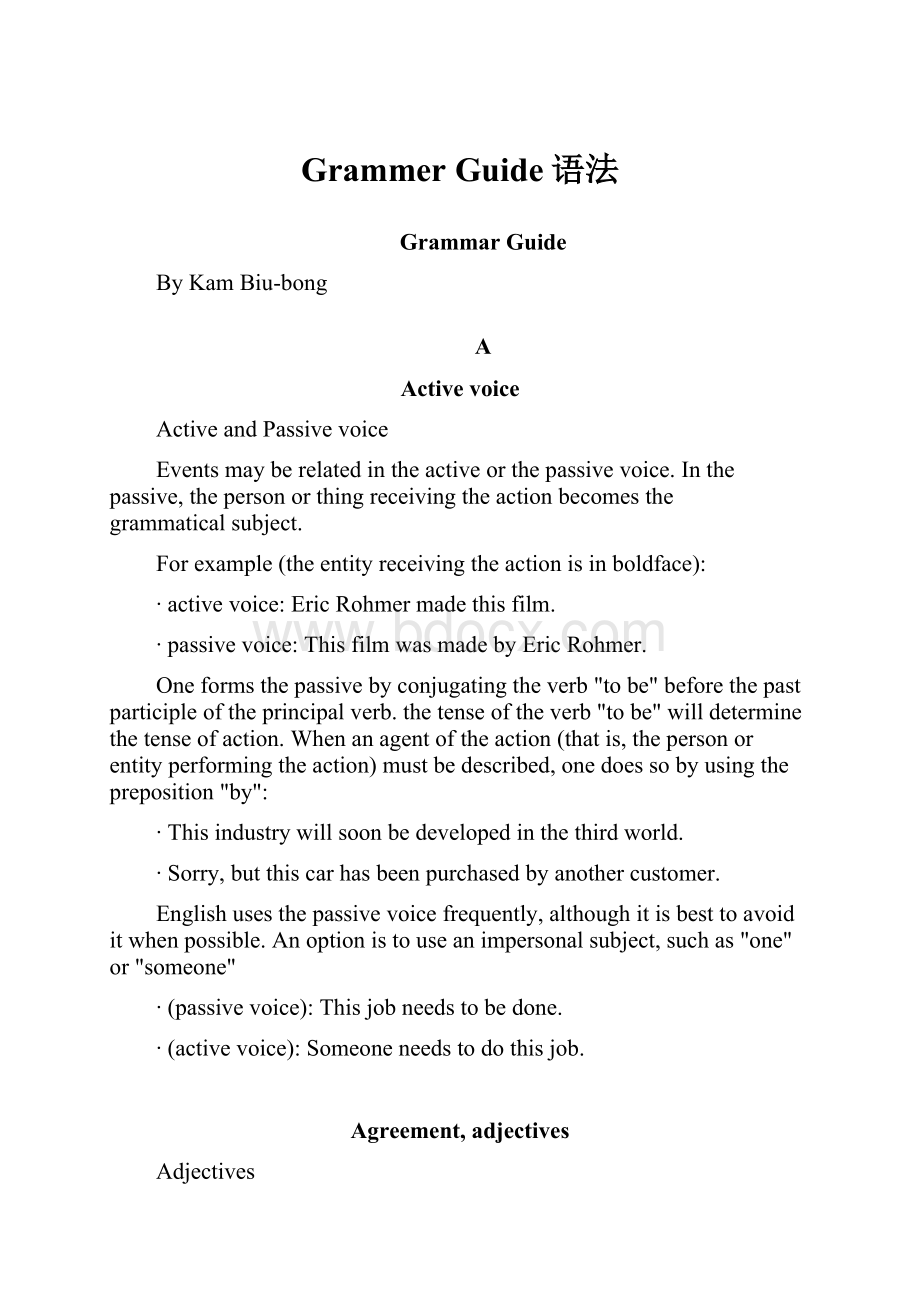Grammer Guide语法.docx
《Grammer Guide语法.docx》由会员分享,可在线阅读,更多相关《Grammer Guide语法.docx(101页珍藏版)》请在冰豆网上搜索。

GrammerGuide语法
GrammarGuide
ByKamBiu-bong
A
Activevoice
ActiveandPassivevoice
Eventsmayberelatedintheactiveorthepassivevoice.Inthepassive,thepersonorthing receiving theactionbecomesthegrammatical subject.
Forexample(theentityreceivingtheactionisinboldface):
∙activevoice:
EricRohmermade thisfilm.
∙passivevoice:
Thisfilm wasmadebyEricRohmer.
Oneformsthepassivebyconjugatingtheverb"tobe"beforethepastparticipleoftheprincipalverb.thetenseoftheverb"tobe"willdeterminethetenseofaction.Whenanagentoftheaction(thatis,thepersonorentity performing theaction)mustbedescribed,onedoessobyusingthepreposition"by":
∙Thisindustry willsoonbedeveloped inthethirdworld.
∙Sorry,butthiscar hasbeenpurchased by anothercustomer.
Englishusesthepassivevoicefrequently,althoughitisbesttoavoiditwhenpossible.Anoptionistouseanimpersonalsubject,suchas"one"or"someone"
∙(passivevoice):
Thisjobneedstobedone.
∙(activevoice):
Someoneneedstodothisjob.
Agreement,adjectives
Adjectives
Forms
AdjectivesaregenerallyinvariableinEnglishanddonotagreewithnounsinnumberandgender;nordotheytakecaseendings:
∙a blue car
∙the great outdoors
∙agroupof young women
However,afewadjectiveshaveaconnotationwhichisslightlymasculineorfeminine.Thus,onesaysthatawomanis beautiful whileamanwouldbecalled handsome.
Adjectivesindicatingreligionornationality(oraregion,stateorprovince)generallybeginwithacapitalletter,whethertheyrefertopeopleorobjects:
∙Sheisan American student.
∙Theygotoa Catholic school.
∙Theyenjoy Breton music.
Usage:
Inanounclusteranadjectivewillbeplaced,withveryfewexceptions, infrontof thenounitmodifies.Whentwoadjectivesprecedeanoun,theycanbeconnectedbyacomma(,)orbytheconjunction"and."Inaseriesofthreeormoreadjectives,oneusuallyuses"and"beforethelastadjectiveinthelist.
Examples:
∙Ilike short novels.
∙Thatfellowwillbea competent worker.
∙Shewrites long and flowery letters.
∙Heworks long, hard hours.
∙Shehada mean, old and overbearing step-mother.
Anadjectivemayfollowthenounwhenitisinapredicate(aftertheverb)orinarelativeclause.(Inrelativeclausestherelativepronounmaybeimplicit.)
Examples:
∙Hewasaman(whowas)always happy tohelpothers.
∙Sheisawoman(whois) true toherself.
∙Theywereentirely satisfied.
Agreement,nouns
Nouns
Gender
InEnglishnounsrarelychangeform,eventoindicategender.Asageneralrule,onlynounsreferringtopeopleandsomeanimalsreflectgenderintheirform.Bythesametoken,unlikemanyotherlanguages,theadjectivesmodifyingnounswillremainunchanged.
Example:
∙Mypoorlittledogdied.
However,certainnouns--especiallythosereferringtopeople--mayhavedifferentformstoindicatemasculineorfeminineusage:
∙man--woman
∙gentleman--lady
∙actor--actress
∙uncle--aunt
∙father--mother
Thesamecanbesaidofcertainmaleandfemaleanimals:
∙abuck,adoe
∙aram,aewe
∙abull,acow
∙astallion,amare
Inothercases,theword"male"or"female"isadded,ifitisconsiderednecessarytobespecific:
∙afemalecat
∙amalegiraffe
Note:
Ifthegenderofthepersonoranimalisknown,onewillgenerallyusethepronoun"he"or"she"torefertoit,asappropriate.Whenthegenderisleftunstated,thepronoun"he"isgenerallyusedwhenspeakingofpeople,or"it"whenspeakingofanimals.Someobjectsarealsoconsideredtobegenderedincertainusages:
somepeoplemayrefertoaboatoracaras"she."
Certainnouns(especiallythenamesofprofessions)aretraditionallyassociatedwithmenorwomen,inwhichcaseonesignalsexceptionstothetraditionbyadding"woman"(or"lady")or"man"totheterm:
∙Theyareinagroupofmaledancers.
∙Mywifepreferstoseeawomandoctor.
Plurals
Asageneralrule,thepluralisformedbyadding"-s"tothesingularformofnouns.
∙shoe-->shoes
∙book-->books
∙river-->rivers
Nounsendingin"s"or"s"willgenerallytaketheending"-es":
∙bus-->buses
∙kiss-->kisses
Wordsendingin"y"willgenerallytaketheending"-ies"inplaceofthe"y":
∙party-->parties
∙supply-->supplies
Certainwordshaveveryirregularformsintheplural:
∙oneman-->twomen
∙onewoman-->twowomen
∙oneperson-->twopeople
∙onefoot-->twofeet
∙onemouse-->twomice
∙onegoose-->twogeese
∙onetooth-->twoteeth
∙onewife-->twowives
∙onechild-->twochildren
∙oneknife-->twoknives
∙onethief-->twothieves
∙onedwarf-->twodwarves(ou:
dwarfs)
∙onepotato-->twopotatoes
∙oneleaf-->twoleaves
∙onelife-->twolives
∙oneloaf-->twoloaves
∙onehalf-->twohalves
Asmallsetofwordsdonotchangeformintheplural:
∙onemoose-->twomoose
∙onesheep-->twosheep
∙oneaircraft-->twoaircraft
WordsofGreekorLatinoriginwhichhaveretainedtheiroriginalendingswillgenerallytakethepluralformassociatedwiththelanguagetheyaredrawnfrom:
∙onealumnus-->twoalumni
∙onesyllabus-->twosyllabi
∙onealumna-->twoalumnae
∙onealga-->manyalgae
∙onecriterion-->manycriteria
∙oneforum-->manyfora(or :
forums)
∙onethesis-->twotheses
∙onehypothesis-->twohypotheses
∙onephenomenon-->twophenomena
∙onecactus-->twocacti(or :
cactuses)
∙onediagnosis-->twodiagnoses
∙oneoasis-->twooases
∙oneanalysis-->twoanalyses
Afewnounsareinvariableorcollective,alwaysindicatingapluralmeaning:
∙Shegavemesome information.
∙Michellehasalotof clothes.
Capitalletters
Certainnounsaregenerallycapitalized,including:
daysoftheweekandmonths;namesofholidays,cities(orstates,etc.)andreligions;nounsofnationality:
∙Minneapolis
∙Jewish
∙Monday
∙April
AdjectiveOrder
Whentwoormoreadjectivesareusedtodescribesomethingtheyareputinacertainorder.Forexample,opinionscomebeforefacts.
∙Beautifullongblackhair
∙Ahandsomeyoungman
∙Anicenewshirt
Nice,beautifulandhandsomeareopinions.Young,new,longandblackarefacts.Opinionscomefirst.Sizecomesbeforeage.Agecomesbeforecolor.Thefollowingchartshowthebasicorderofadjectives,butyoushouldknowthatsometimesthisorderisnotfollowed.
[NOTEINTHEABOVECHART“shape”(round,square)shouldbeputbetween“age”and“color”,andthe“noun”columnshouldbeseparatedfromtheothercolumns,witha+inserted.]
Example:
Werentedanicelittlebrownlogcabinbyalake.
Note:
Weusuallylimitthenumberofadjectivesprecedinganountothree.
Adjectives,demonstrative
Demonstrativeadjectives
Demonstrativeadjectiveshavetwosingularforms(this, that)andtwopluralforms(these, those).Theseadjectivesareusedtodesignateproximitytoanobject,ortodistinguishbetweenanobjectthatisclose(intimeorspace)andonethatismoreremote.Usually"this"and"these"signalproximity,while"that"and"those"suggestdistance:
∙These booksaretooexpensive.
∙This carisresponsive.
∙That manirritatesme!
∙This hotelismoreexpensivethan that one.
Demonstrativepronouns
Demonstrativepronounshavethesameformasthedemonstrativeadjectives,butareusedwithoutthenounstowhichtheyrefer.Inthesingular,whendesignatingaspecificobject,thepronoun"one"isoftenadded:
∙Thesetomatoesarefresherthan those.
∙Thesearebetterthan those.
∙Wouldyoulikealittleof this?
∙That strikesmeasreallyweird!
∙Thebookismoreinterestingthan thatone.
Infrontofarelativepronoun, thedemonstrativepronounbecomes"theone"or"theones"(whenspeakingofthings),or"he/shewho","theywho"(whenspeakingofpeople):
∙Thisfilmis theone thatyouhatedsomuch.
∙Hewho eatswellworkswell.
∙Thispenis theone withwhichthePresidentsignedthenewlaw.
Adjectives,possessive
Possession
InEnglishpossessionmaybeexpressedinfivedifferentways:
Possessiveadjectives
Possessiveadjectivesagreewiththepersontowhomtheyrefer:
∙I-->my
∙you-->your
∙he,her,it-->his (masculine),her (feminine),its (impersonal)
∙we-->our
∙they-->their
So,
∙Ihavelost my keys.
∙Theyarecomingin their car.
∙Imet your grandparents.
∙Thiscarhaslost its power.
Note:
InEnglishthepossessiveadjectiveisusedtorefertopartsofthebody:
∙Shebrushes her teethtwiceaday.
∙Hebroke his armplayingsoccer.
∙His stomachaches.
Possessivepronouns
Possessivepronouns,liketheadjectives,agreewiththepersontowhomtheyrefer.Singularandpluralsharethesameform:
∙I-->mine
∙your-->yours
∙he,she,it-->his (masculine),hers (feminine), its (impersonal)
∙we-->ours
∙they-->theirs
So,
∙Ihavemylikes,andshehas hers.
∙Ifyougivemeoneof yours,I'llgiveyouoneof mine.
∙Ilikeourhouse,butfrankly,Iamjealousof theirs!
∙That's mine!
Theverb"tobelongto"
Theverb"tobelongto"indicatesownershiporpossession:
∙Thatpoodle belongsto Louise.
∙Theworld belongsto you.
The"s"ofpossession
Onemayadd"--'s"toanynouninordertoindicatepossession:
∙Ijustread Gustavo’s book.
∙Thefront door's lockisbroken.
∙Manyofthe world's countriesarepoor.
Note:
Donotconfusethe"s"ofpossessionwiththecontractionoftheverb"is":
∙Fred'sgoingtofetchit.(=Fred is goingtofetchit.)
∙Thetrain'slateagain.(=Thetrain is lateagain.)
"Whose"forindicatingpossession
"Whose"willbeplacedbeforethepossession(theobjectpossessed),andwillreferownershiptotheprecedingnoun:
∙Themanwhosedogbitmesai